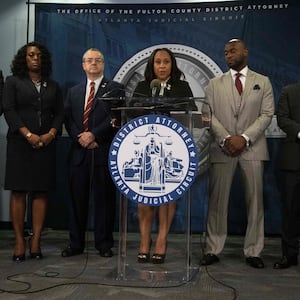Fani Willis has brought the indictment against former President Donald J. Trump and his inner circle that special counsel Jack Smith could have brought if he had been given more time from Attorney General Merrick Garland to make his case.
Willis, the District Attorney for Fulton County, Georgia, has charged Trump and 18 co-defendants—including Rudy Giuliani, Mark Meadows, Sydney Powell, John Eastman—with a 41 count indictment alleging that they conspired to form a criminal enterprise under Georgia’s racketeering statute to unlawfully overturn the 2020 election. In total, the indictment lists 161 “overt acts”—steps taken in furtherance of the racketeering conspiracy.
These actions include the intimidation of election workers Ruby Freeman and Shaye Moss—who were wrongfully targeted by Trump and Giuliani with baseless claims of having stolen votes—as well as the plans to use so-called “false elector” slates to be substituted for the actual Electoral College electors that had been voted in by the people of Georgia.
Arising from an investigation spanning two years and two grand juries, Willis’ charging of the other defendants marks the first time that members of Trump’s inner circle are being held legally accountable for their roles in the efforts to overturn the 2020 election.
Willis skillfully weaves the actions of these conspirators into a story that tells the numerous steps involved in the conspiracy. It is this level of detail, combined with the naming of the actors, that poses the greatest threat to Trump’s much-vaunted First Amendment defense—in which Trump essentially claims that he was just talking rather than committing a crime. The 161 overt acts described by Willis, that involved 18 other co-defendants, tends to shred Trump’s stated defense that he was only talking.
The Georgia charges are narrower compared to the federal indictment election interference charges brought by special counsel Jack Smith.
Willis—as befitting her authority as a state prosecutor—charges only actions related to what happened in her state, while Jack Smith describes a nationwide conspiracy that involved multiple states including Georgia. But Smith’s indictment—perhaps with the intent of streamlining his case in order to have a chance at being tried before the presidential election season—references six co-conspirators. For her part, Willis’ decision to name and charge the conspirators that Smith left unnamed makes the effect of her case broader than Smith’s case.
Purely as a matter of deterrence, her charges send a message to the Republican establishment that mere self-serving loyalty to Trump is not a shield against criminal prosecution.
There is a gravity to Willis’ case that is greater than her status as a state district attorney. Perhaps that comes from the fact that at any other time in our history, the criminal charging of people like Rudy Giuliani—the former Mayor of New York City and once the top federal prosecutor for the city—and Mark Meadows—the former White House chief of staff—would be major standalone news.
But today, their notoriety pales next to the historical significance of a former president who now faces four different criminal indictments.
Her case also adds far more peril to Trump because it is the second case brought by state prosecutors, which make the charges immune to the possibility of pardon by Trump or any other Republican presidential administration.
This fourth case also severely diminishes Trump’s chances of being able to completely evade a criminal conviction. He is now being charged by the Justice Department, the Manhattan District Attorney’s Office and Willis. Such a lineup is rare in criminal prosecutions.
While defendants do get tried multiple times, those instances usually involve mistrials where the defendant is re-tried on the same case by the same prosecutor. Multiple simultaneous cases by federal and state prosecutors are rare and present an impossible situation for any defendant—even a former president.
It’s not just the financial and psychological stress that makes the situation impossible for Trump. It is who is charging him. The Justice Department, the Manhattan D.A., and Fulton County D.A. are all extremely experienced prosecutors and, in the case of DOJ and Manhattan, they are historically fabled offices for their prosecutorial prowess. Just ask Rudy Giuliani who was the former number three at DOJ and a former top federal prosecutor.
The chances of Trump being able to beat all three of these prosecutors in court in four different cases are essentially non-existent. For Trump that means he is beginning to feel the pressure of the criminal justice system’s often slow but also inexorable grind.









